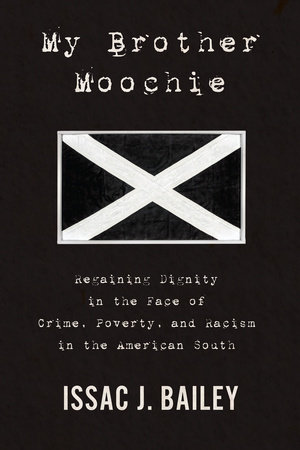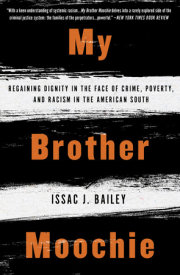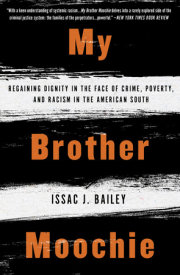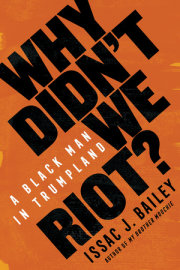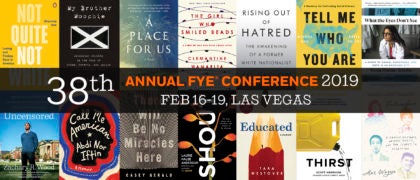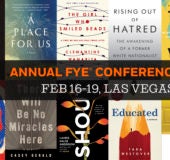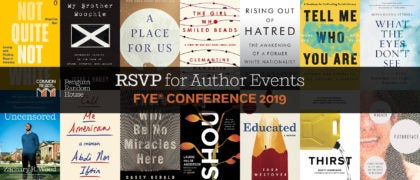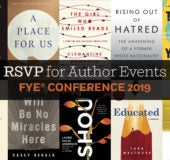MONSTERS
I held my thirteen-year-old son’s chin between the index finger and thumb of my right hand, squeezing and lifting it ever so slightly to make sure our eyes locked. Our faces were so close I’m sure he could smell my breath, feel the spittle from my mouth.
“I can’t tell you how angry I am,” I told him in a barely audible voice. If I yelled, I knew I’d lose control.
He was nearly my height and athletic, a nationally ranked high jumper and middle-distance sprinter. I was still built like the football player I had been a couple of decades earlier. I wanted him to feel that physical difference like he never had.
“I can’t
tell you how
angry I am right now,” I repeated.
The slightest tear began welling up in the corner of Kyle’s right eye. I let his chin go and left him alone in his bedroom, though, sadly, not because of what I had almost done, but because I wanted to do something more to cause
real tears, because I wanted to ignore that my wife, Tracy, told me hitting him would be wrong, and ineffective, because I wanted to literally shake maturity right into him—because I so desperately wanted to save him from . . . I’m not even quite sure what. All I had caught him doing was being a teenager, being less than honest with me one too many times, letting his grades slip a little, arming himself with a more defiant attitude as if to announce his newly discovered manhood to the world. Still, he’s well on his way to becoming a better man than I’ll ever be. And yet, my instinct was to crush his soul to save his black body from some undetermined future harm that may never materialize.
He was born in 2001, the year researchers said we crossed a Rubicon, when fully a third of young black men Kyle’s age were projected to end up behind bars if we didn’t make significant changes in the way we treat them, and how they treat themselves. It wasn’t that statistic that scared me, though. It was what I had long known, and why when Tracy and I decided to have kids, I initially wanted a girl.
I was afraid of black boys. The image of them was everything I didn’t want to be.
The shameful truth is that a not insignificant part of my mind had so thoroughly absorbed the ugly myths about black boys, I seriously wondered if violent behavior was the result of an immutable genetic reality unique to those born black and male like me.
I was a black boy who grew up with eight black brothers, and a nephew raised like a brother, along with two black sisters. While researchers might turn out to be right, and a full third of young black men might end up in jail or prison at some point in their lives, it’s already been worse for us. Half of the black boys in my immediate family ended up behind bars. I spent much of my early parenting years trying to deny that the shame of that reality had any effect on my treatment of my only son. I was lying to myself.
I knew it almost instantly when I walked out of Kyle’s room and downstairs and remembered the years-long debate within my family about why some of us went astray. Half of my family seems convinced our disparate outcomes resulted from my mother’s decision to not beat the youngest, those who got into the most trouble, the way she had beaten the rest of us. That belief is rooted in how black people were treated as slaves in the American South and the Bible most black people—nearly 80 percent of black Americans self-identify as Christian, more than any other group in a nation in which religious identity is undergoing a transformation—read and swear by. I can’t count the number of times I heard the words “black people!” in exasperation at the sight of another black boy who dropped out of school or a black man milling around at the park with a tall can of Schlitz Malt Liquor in a brown paper bag. They weren’t individuals who had made wrecks of their lives or succumbed to overwhelming challenges; they were representations of the black race. That’s the way
many of us spoke about struggling black men. Even in the black churches I attended, Father’s Day was used more often as a scolding for deadbeat dads than a celebration of fathers working twelve-hour shifts in a nearby factory to keep the lights on.
I never said such things out loud. But it doesn’t mean I didn’t grow up believing them, too. Deep into adulthood, I thought I was one of the progressive ones—until I almost beat my son for no good reason. About a week after the encounter with Kyle, a cop in a South Carolina high school made national news for assaulting a black teenage girl who had refused to put away her cell phone. He threw her around as though tossing trash in a Dumpster. I was horrified and outraged and argued with anyone who tried to deflect attention from what that officer did.
“No, she was not the problem, it was the adults,” I said loudly. “She did what teenagers since the Stone Age have done, get under the skin of adults.”
What I didn’t say is that too many black parents treat their kids the way that cop treated that teenage girl, with a kind of desperate hatred born of a warped sense of love. I’m not just referring to extreme corporal punishment, the kind on display during the Baltimore riots when a black mom was deemed heroic for being caught on TV wailing on her wayward son. It’s also because despite our loud protestations, many of us don’t think we’ve been fully accepted in this still largely white-dominated society. Unruly, nappy-headed kids in our midst make us think we never will. That’s why so many of us are more comfortable when our kids fit, rather than reinvent, the mold.
We are willing to beat our children to near death if that’s what it takes to get to a successful adulthood. When they step out of line, we first wonder if we spared the rod too much, not if we didn’t give enough hugs. We are willing to call them the ugliest names, label them as thugs, see them as monsters, likely out of an effort to prove to others that, yes, we, too, believe in personal responsibility; we, too, can do right and be right and worthy of their respect. Before that awful day with my son, here’s what I had done to prove I was one of the proverbial good black people: I married Tracy Swinton. We took precautions to not have kids before we were ready. We bought a house, then planned to bring kids into our world. We decided we wouldn’t be working full-time jobs simultaneously because we wanted a lead parent home with our children. That decision caused us financial stress—it got so bad we had to dig out coins from between the couch cushions to buy gasoline—but we thought it was the right thing to do. We worked hard to advance in our careers, me as a journalist, Tracy as an educator and consultant who earned a doctorate in education and founded a nonprofit literacy program to help at-risk kids. We joined a church, did community work, kept our kids in the presence of good influences. We volunteered in the schools and showed up for performances and parent-teacher conferences. We monitored their homework and responded every time a teacher had a report, good or bad. We cheered at their sporting events, provided incentives to keep them inspired, implemented various forms of discipline—took away privileges, instituted earlier bedtimes, unleashed a plastic ruler on an open palm—and hugged them and told them we loved them, that we expected great things from them because they could accomplish just about anything they wanted. And despite all of that, I was standing in my son’s room believing hurting him was the way to save him from dangers that had yet to manifest.
I wasn’t only angry. I was hurt, disappointed. Terrified. All parents are afraid for their children. My fear was deeper, because no matter how much I’ve tried to leave it behind, the stereotypical image of the violent black boy who deserves to have been shot down in the street by a cop or forced to rot away in solitary confinement never leaves me. It doesn’t matter that I’ve studied the issue for the past two decades and can cite study after study about the myth of such an image, about how implicit and overt bias continue fueling it, about how black boys, and black girls, start off at a disadvantage because of the historical realities that accompany them and their skin wherever they go.
I’m scared for Kyle in a way many black parents are scared for their kids. I suspect, though, that white parents don’t wonder about the pathology of their race no matter how many times white boys shoot up elementary schools or movie theaters. Many black parents, like most black people I’ve ever known, grimace every time a mug shot of a black boy shows up on the TV news or in the local paper, because they know the image of yet another black boy doing something awful suggests something awful about them.
We aren’t just parenting and suffering the silent second-guessing that affects everyone who has ever tried to raise a teenager. We are still trying to prove our worth. And because we don’t realize that’s a large portion of our motivation, our children take it on the chin.
We lament that society doesn’t allow them to just be kids, to work their way through the stupid things we all did as kids. But we don’t allow them to be just that, either. Their talking back to the teacher isn’t just typical teen defiance that’s been with us since man began communicating and needs to be dealt with proportionately; it’s evidence that we, as a people, have failed, that they are making us look bad, as a race. In our quiet moments, we find it hard to believe what should be obvious, that at-risk black boys who find in gangs stability and love they couldn’t find elsewhere, for whatever reason, are just following a natural pattern seen in all groups of young people who feel alienated and left behind. Instead, we beat ourselves up emotionally, which is why we tolerate so much of the harm—physical, psychic, emotional—that others continuously unleash upon them.
Because of that, black Americans are connected in a way white people aren’t. It is a progressive conceit that race matters less today, but when a Tamir Rice is shot, many, if not most, black parents cringe because he wore the same skin our children do, and we know that skin played a significant role in his death. Because of that, families like mine feel a double dose of shame that separates us even from other black families. We are the black sheep of the black sheep. We are the source of black embarrassment, the poker that stirs the embers of black shame. We are the seed of truth supplying sustenance to the stereotype. We didn’t hold up our end of the bargain in the respectability game.
As a member of the perpetrator’s family, that’s why you don’t know what you are allowed to feel, or think. Victims can mourn, and others will help them mourn. When prosecutors and pundits talk about justice, they are referring to victims and their families, not families like mine. Why should anybody give a damn that the ripple effects of crime change our lives, too? We don’t get to mourn. We don’t get to reflect, at least not fully, not publicly.
To stand by a man you love after he has done something dastardly is to be accused of having a lack of respect for what the victim has endured. To demand that he not be known solely by his worst act is to be accused of excusing evil. To not be there for him would feel like a dereliction of familial duty, a betrayal of the worst order. To state the truth—that sentencing him to a long stay behind bars would be a devastating blow to your family—is to open yourself up to ridicule and screams of, “He should have thought about that before he decided to kill a man.”
There are no good options for families like mine. Navigating the internal struggle and external pressure becomes an impossibility. Shame gives way to a self-imposed silence that makes seeking, or receiving, potentially life-altering help less likely by the day.
We let other black and marginalized people down, made it harder for them to get a fair hearing, because there’s shame that comes with being forced to walk around in dark skin in a society built upon the demonization of dark skin. Then there’s the shame that comes from the realization that we have committed acts pundits and politicians have used to either justify that demonization or declare that their fear of those who look like us is warranted. White supremacists and white nationalists aren’t our friends, but they love having us around. Our mistakes make it easier for them to sell their lies about pathological black violence. Potential allies speak of us in hushed tones, if at all, while proudly pushing for humane criminal justice reform for nonviolent offenders and those who love them. Forcefully arguing in favor of similar consideration for families like mine is just too risky.
We are the nightmare, not the hope, of the slave.
That’s how it feels to be on this side of the criminal justice system. We are the rightly convicted, not the unjustly accused. We’ve done things David Duke has long said black people would if given the chance.
That’s why I’ve been afraid of myself for as long as I’ve known myself. Fortunately, I haven’t known myself very long, because I didn’t always know that I was capable of murder. Neither did I know you didn’t have to find your way to a battlefield as an adult to suffer post-traumatic stress disorder. All you had to do was be born into the middle of a war, have your nine-year-old eyes watch helplessly as your oldest brother is taken away in handcuffs and your thirty-five-year-old brain later produce overpowering images of you doing to your wife and kids what your brother did to the man whose life he took.
Copyright © 2018 by Issac J. Bailey. All rights reserved. No part of this excerpt may be reproduced or reprinted without permission in writing from the publisher.

